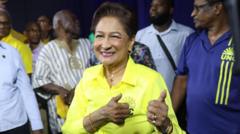The Caribbean nation of Trinidad and Tobago witnessed a monumental political shift as the opposition United National Congress (UNC), under the leadership of Kamla Persad-Bissessar, emerged victorious in the recent parliamentary elections. This win not only marks a return for Persad-Bissessar, who previously served as prime minister from 2010 to 2015, but also a notable defeat for the incumbent People's National Movement (PNM).
The preliminary results revealed that the centrist UNC successfully captured several parliamentary seats that were once held by the PNM. Kamla Persad-Bissessar campaigned on pledges to improve wages and enhance job creation in a country currently facing economic challenges and a troubling rise in crime rates.
The leader of the PNM, Keith Rowley, publicly acknowledged his party's defeat, marking a shift in political power. Rowley had served as prime minister until earlier this year and had only recently handed leadership to Stuart Young, who orchestrated a snap election in an attempt to consolidate power. Critics viewed this move as controversial, questioning its legitimacy amidst ongoing political tensions.
In her victory speech, Persad-Bissessar emphasized her commitment to supporting citizens, particularly public sector workers and senior citizens. "This victory is for those who deserve better salaries, for re-opening hospitals, and for empowering our youth with technology," she declared to a jubilant crowd at the UNC headquarters.
As the newly appointed prime minister prepares to take office, the nation watches closely to see how her administration will address pressing issues such as public welfare, job creation, and ongoing crime reduction.
The preliminary results revealed that the centrist UNC successfully captured several parliamentary seats that were once held by the PNM. Kamla Persad-Bissessar campaigned on pledges to improve wages and enhance job creation in a country currently facing economic challenges and a troubling rise in crime rates.
The leader of the PNM, Keith Rowley, publicly acknowledged his party's defeat, marking a shift in political power. Rowley had served as prime minister until earlier this year and had only recently handed leadership to Stuart Young, who orchestrated a snap election in an attempt to consolidate power. Critics viewed this move as controversial, questioning its legitimacy amidst ongoing political tensions.
In her victory speech, Persad-Bissessar emphasized her commitment to supporting citizens, particularly public sector workers and senior citizens. "This victory is for those who deserve better salaries, for re-opening hospitals, and for empowering our youth with technology," she declared to a jubilant crowd at the UNC headquarters.
As the newly appointed prime minister prepares to take office, the nation watches closely to see how her administration will address pressing issues such as public welfare, job creation, and ongoing crime reduction.





















